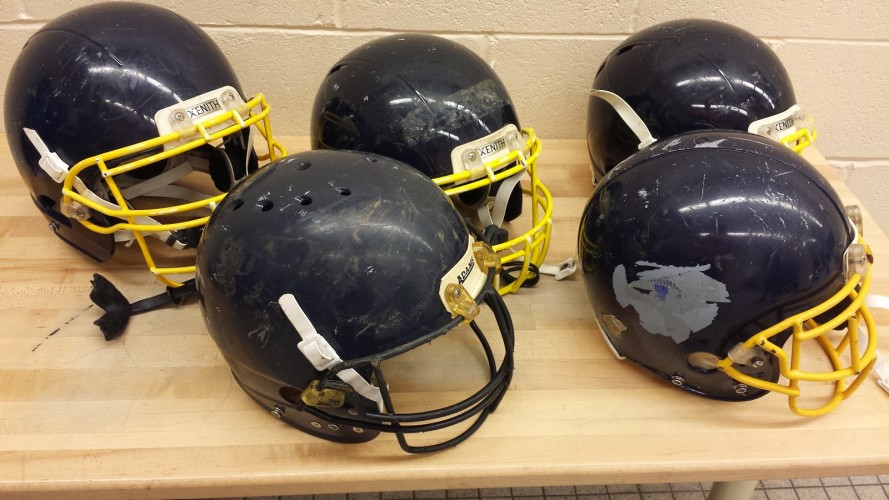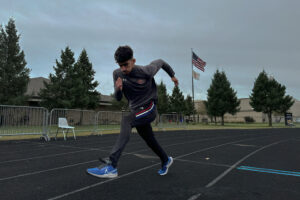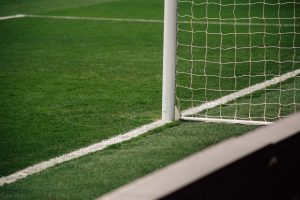The time where youth were able to go to school while still playing safely on sport teams could be ending. Challenges facing one high school coach in Chicago beyond the playbook show how this is occurring.
Farragut Career Academy‘s varsity football team lacks funds and resources according to Head Coach Niven Hinkle Sr.
Hinkle Sr., who accepted the position in June, said when he arrived and saw the condition of the school, he knew it was in a rebuilding process.
“I realized that we had a lot of rebuilding to do,” Hinkle Sr. said. “But I was under the impression that I was getting help in [retrieving adequate] equipment for the football team.”

“I saw the locker room and it was in poor condition,” Hinkle Sr. said. “The helmets [looked like] the same ones I had in high-school.”
While there are a lot of other methods to help players remain safe, the top priority is [proper] helmets, he said.
“Helmets are No. 1,” Hinkle Sr. said. “Our helmets are not [ready] for the football season.”
It is obvious that a helmet in bad condition means that a player is at risk of receiving a broken jaw or concussion. However, when the inside of a helmets is unsanitary, that can lead to health infections, according to Hinkle Sr.
On top of that, he said some players don’t even have equipment that fits them properly.

[pullquote]”I can’t give a player any helmet because it has to fit their head,” Hinkle Sr. said. “A lot of the face-masks do not even go with the helmets. You can not just put a face-mask on a helmet…even though you may not take a blow to the face, the blow to the brain can cause the player to have a concussion because the face-mask and helmet does not fit.”[/pullquote]
The fit of the equipment isn’t the only issue Hinkle Sr. has faced. In one game, a player’s helmet broke while he was on the field.
“Practice will always be different from the game,” Hinkle Sr. said. “When the real game comes, the level of intensity gets higher. We had to rotate helmets and this is what we are [still] doing because the helmets are not up to par.”
Not only do the poor conditions of the helmets hamper Hinkle Sr.’s ability to coach consistently, but they reduce the players’ opportunities for playing time each week.
During the first three games of the season, Hinkle could only play 13-15 players, compared to the other team having the ability to play 40.
With such a small roster to work with, Hinkle Sr. and the Admirals are off to a rough season start – dropping their first game to the Kelly Trojans (2-1), by a final score of 31-20. In their second game, they were shutout, 46-0, by the Juarez Eagles (1-0). Also, they lost their third game against the South Shore Tars (2-0) with a final score of 46-0. The Admirals’ next game is against the Kennedy Crusaders (0-3) on Sept. 20 at 9:30 a.m.
The coach has spoken to the athletic director, but has been told to raise the money for equipment on his own.
“It’s been made aware that we need funding,” he said. “We need tens of thousands of dollars, maybe close to forty-thousand dollars.”
His players are [highly upset] because they can’t even get a simple mouthpiece, Hinkle Sr. added.
“I have had to spend my personal money to get small equipment for the players,” he said. “That’s ridiculous, and it doesn’t make any sense.”
To take it further, Hinkle Sr. said the team has to find their own way to games.
“We even have to get our own transportation, and if we don’t have [enough] money in our budget then we can’t go to the game,” he said.
The only reason the players are pushing through this devastating situation is the motivation of gaining a better future.
Hinkle Sr., who played football from the time he was nine until he was 22 years old, said he was able to attend Alabama State University on a four-year scholarship.
And now he’s determined to not only make sure his players love [and understand] the game, but to also have the chance to earn a college degree.
“My heart is to get these student-athletes into a college or university,” he said. “I’m trying to make sure they are staying up on their academics. The first thing I tell them is ‘Make sure you are going to class and learning, and then we can take care of business on the field.'”
“This is what is keeping us motivated,” Hinkle added. “I am trying to make sure they become productive men one day.”
Pastor William E. Hall said the Rev. Jesse Jackson Sr., met with Hinkle on Aug. 23 to discuss the team’s challenges in regards to the lack of equipment and funding.
“We have been working to figure out a way to help the coach and his team get out of an unsanitary situation,” Hall said.
Academics, athletics and character-building is part of a well-rounded education, Jackson said.
“Youth need to have baseball, choir, band, soccer and more because it forms a wholesome competition and development,” Jackson said. “The Jackie Robinson West Little League’s accomplishments affirmed that extracurricular activities matter. But they need to have the equipment to do it.”
The Jackie Robinson West Little League team, which won the U.S. Little League Baseball World Series title this year, were an example of the value and impact of youth athletics on a community.
“In all the joy that we had about the Jackie Robinson Little League, it didn’t come out of the school system,” Jackson said. “Those were children [who were] picked out of our neighborhoods and became a team.”
Jackson said proper assessment for a budget needs to be done for every school that lacks recreational equipment.
“That’s how you get youth out of gangs; you give them a meaningful activity,” Jackson said. “[Youth] who play [sports] attend school. I read that equal opportunity and protection is part of the America promise.”
– contributor: Joseph Phillips, founder of SC Media News and Sports.












Be First to Comment